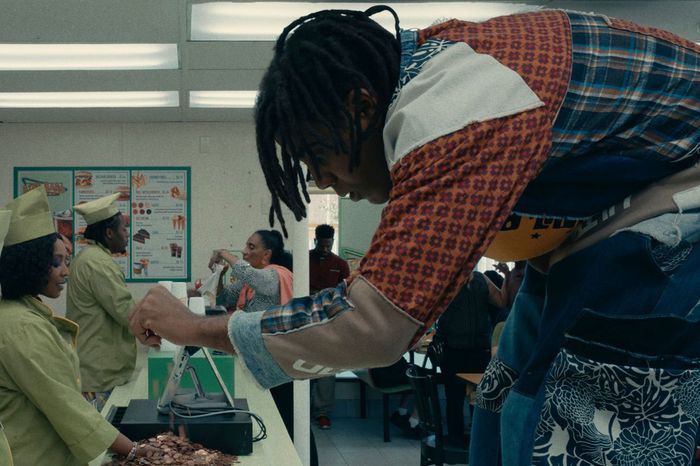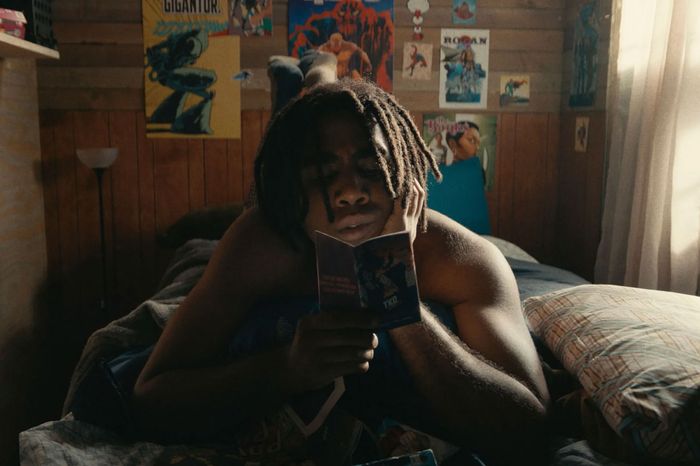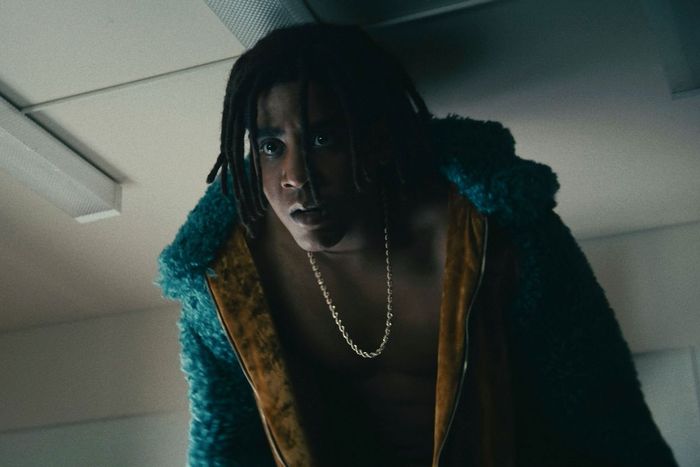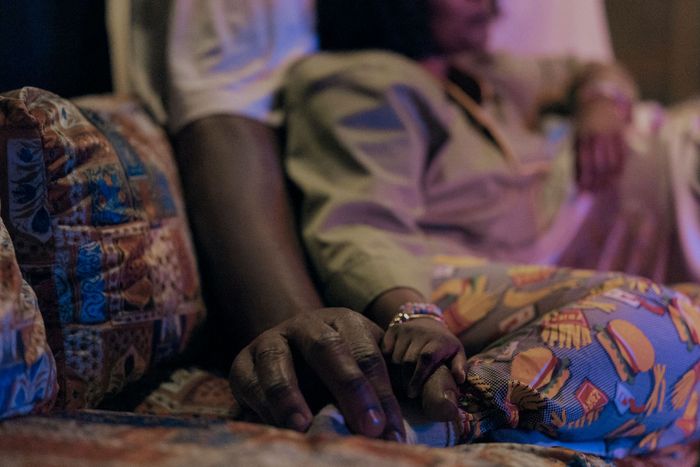
In Boots Riley’s I’m a Virgo, Jharrel Jerome plays Cootie, a 13-foot-tall Black man who has lived 19 years of his life in total secrecy. His guardians, Uncle Martisse and Aunt LaFrancine, feared the world would either attack or manipulate Cootie, so they’re anxious when he finally leaves home two years earlier than they’d planned. Over the course of seven episodes, Cootie makes new friends, including organizer and activist Jones; starts dating Flora, a burger cook with superpowers; and realizes that his longtime hero, the comic-book publisher–tech billionaire–vigilante Jay Whittle (a.k.a. the Hero), is more of a threat to his Oakland community than its protector.
Onscreen, Cootie is making connections with these people, but behind the scenes, Jerome was shooting by himself, a requirement of the forced-perspective technique and other practical effects Riley employed to make Jerome appear more than twice the size of his castmates. The experience was physically and emotionally demanding but added an additional layer to Cootie’s coming-of-age performance. If you look closely, Jerome says, you can see his eyes wandering, a natural consequence of not knowing where exactly his scene partner’s eyes would be.
“In four months, Cootie went outside for the first time, tried fast food for the first time, met a girl for the first time, fell in love for the first time, made love for the first time,” Jerome says. “Having moments where I didn’t even know where to look formed Cootie.”
A second season of I’m a Virgo has yet to be announced, and Riley says 60 percent of what he originally conceived for season one was cut for budget reasons, including what Jerome describes as an “original ending that I did love a lot.” I’m a Virgo’s first season instead ends with Cootie in a tangle of contradictions, searching for a purpose just out of reach: His parents want him to be a revolutionary, but he’s wary of engaging in one-off actions or the kinds of demonstrations that Jones says will never weaken the racism and classism embedded in American systems. The Hero paints him as a monster in a new comic book, yet Flora describes him as the lover she’s been waiting for (“I knew you were missing the same puzzle pieces as me”). “He’s still new,” says Jerome, who was also an executive producer on the series. “He’s still not a fighter. He’s still not a villain or a hero yet. He’s still a lost boy.”
As an actor, you’ve described yourself as a natural comedian and talked about wanting to do more comedy. Did you feel able to tap into that quality on I’m a Virgo?
I definitely got to stretch some comedy chops in this one, but Cootie is not necessarily a funny person. What he does just happens to be funny because it’s so different and weird. He’s in a fast-food restaurant, hunched over, dropping 800 pennies on the counter, making a face that he saw off a TV screen. It’s not him making a joke; the comedy for Cootie came accidentally.
And although I am naturally comedic, I can admit that I do struggle with comedy onscreen. The scene where Cootie goes to the club for the first time was day two of shooting. I was brand new to forced perspective, and I was still adjusting to the idea of what we were doing — and then on top of that, here comes a very funny scene. When I read it, I knew that it was hilarious, and I got very nervous because I started to think, Time to try to make people laugh. I did the scene maybe three or four times, and something felt so wrong about it. I felt like I was doing too much. I went to Boots about it. I wonder if he remembers this conversation. I told him, “I can’t get it. I know it’s funny. I’m trying. How do I make it funny?” And he said, “The script is already funny. You don’t have to make it funny. Just go and be Cootie.” That was such a great note that he gave me: to just not make it funny at all.
Both I’m a Virgo and your last series, When They See Us, address the damage that can be done to people who are being misconceived. Was it intentional or a coincidence for you to dive into that thematic territory again?
Maybe a bit of both. It’s definitely a theme I’m very interested in. I’ve always had certain identity issues coming from where I’m from and certain dynamics in my family that I’ve had to deal with at a very young age. It is exciting, and maybe even a bit easier, to fall into a character who’s lost in their identity. Three years ago on Emmy Night, everybody’s like, “Dude, you’re the man. You’re huge.” But I was still feeling personally small. That was the beauty of Cootie: He was this larger-than-life man but really just this innocent, pure child on the inside.
But then I think it also just comes with the age I’m playing at the moment. Eventually, I’ll be playing a bit older and playing roles that are more grounded — less about Who am I? and more about I’ve been through something now, and I’ve got to overcome it. But I like this sweet spot that I’m at where I’m getting to play characters that are young but have so much depth behind them and so much to go through.
I’m a Virgo is so much about comic books and superheroes, and I’m wondering if you turned to either of those for inspiration.
Funny enough, I didn’t lean so much on the superhero genre. I’m a fan of the superhero genre; I grew up loving superhero films. But for me, the way into Cootie was his innocence and his naïveté. I threw out the idea that he was 13 feet tall early on. He wakes up every day and he is 13 feet, but that’s not a shock to him. The wonderment and the shock of me being so big — that wouldn’t be what I should play because that’s who he is on the daily.
For me, it was, How do I make it translate that he’s 19 years old, but he’s been confined to his home his entire life? It would kind of force him to be a bit behind, socially or intellectually; even if he’s well read, even if he’s smart, he’s still a couple steps behind. It was playing with the bright eyes — it was playing with the multiple facial expressions. Then it becomes the emotions: the oversensitivity, the dramatic effects that kids love to add into their sentences. The walk was important for me. Clearly, I haven’t walked often, or I haven’t walked in much space before. It was trying to find his pigeon toe and his hunched back.
Shooting forced perspective helped me play Cootie a lot more because so often I was very lost. I didn’t even know where to look sometimes. In the rehearsals, it would be like, “This is the green X mark. It’s gonna move over this way, so look at this red X mark after this line and then you’re gonna look back at the green X mark at the end of the scene. Action!” And at “Action,” I’m trying to remember exactly where I go and where I look, and I’m feeling so uncomfortable as an actor. On “Cut,” I’m like, “Hey, Boots, man. How was that? Because I’m not too sure how that was. I was so in my head, and I forgot certain things.” And he looked at me like [imitates Riley], “Isn’t that how Cootie is feeling in this moment?”
Did you research forced perspective to prepare?
There’s a YouTube video of the Lord of the Rings forced perspective and how they were able to shoot one of those scenes. I watched the video and I thought, It’s gonna be cool. It sounds like it’s gonna be fun. But to be honest, sometimes it wasn’t fun. Sometimes it was very hard. Sometimes it was very frustrating.
Yeah, you’ve described the forced-perspective set as a “carnival.” What was the first day on set like?
My first day, I was hunched over all day, and it was just full throttle into the forced-perspective world. I think that’s why I call it a carnival — because as soon as you walk in, it’s go time. It’s overwhelming. I remember telling Boots how uncomfortable I was. He’d say, “I can see that,” and we’d figure out where to go. There are only a few moments where it wasn’t all that bad. When I shot in my room, they built the room, and often there would just be a camera and I could sit there by myself and have freedom in a space to stretch. Whenever I was in his room, I felt like I could actually breathe.
The first scene was when Cootie is talking to Jones inside the office that she’s organizing the march in, and he’s telling Jones about how he’s gonna be the villain, the bad guy. She’s arguing, and they’re just going back and forth. Off rip, the scene is intense and it has this tension between two people who have been set up to be friends. The way we shot that scene was they made a big platform that was about seven feet tall, and I got on a ladder and climbed on top of the platform so that my head got to the ceiling. I did the entire scene on the platform. The cameras would either be under me and it looked like I was huge or they would put a small Jones doll on the platform and go behind the doll so it looked like her head was there.
A centerpiece of this season is the relationship between Cootie and Flora, and yet you and Flora actress Olivia Washington never filmed scenes together. How did you and Olivia build your chemistry?
We had extensive conversations. We talked a lot about relationships in general. We were both dealing with relationships separately, and we used a lot of our personal thoughts. We opened up; we were very vulnerable with each other about feelings that we’ve never understood in relationships. We opened up about who we want to be in a relationship or how we want to change in a relationship. Doing that at the surface helped feed all the subconscious stuff. I was very surprised to see how much we connected without even looking at each other during shooting.
But it’s been that way since before we were Cootie and Flora. I got the chance to sit in on a lot of the auditions toward the end because I got to EP. I was in the rooms doing chemistry reads with all the friends and all the Floras. A lot of different actresses came in and they did really well, but when Olivia came in, she just did something so different. How I saw Flora was this very confident, sensual person who has this mystique. That’s how I viewed it when I first read the script. But Olivia comes in and she breaks down every single idea that I personally had of who I thought Flora would be. She brought in this nuance and this creativity that honestly gave me chills. I remember when I was reading the lines, I was almost so distracted I couldn’t even do the scene with her. I was like, Who is this version of Flora? Those unique, quirky mannerisms that Flora has in the show — those little tics when her lip closes up and her stutter and her hesitation — none of that’s in the script. That’s all designed and curated by Olivia. There was awkwardness to Flora; there was a charge behind her eyes. It was just so layered. All of a sudden, Flora had this life that was beyond the page. When she walked out, me and Boots looked at each other like, Who is going to beat that?
On the flip side of that, you’ve mentioned that you didn’t spend as much time with Walton Goggins, who plays Cootie’s nemesis, Jay Whittle/the Hero. What was helpful about not having an existing relationship with him?
Cootie has this false idea of who the Hero is. He loves and cherishes him and has this view of him being this godlike presence. And you can’t ever really … I’m trying to word this right. It’s not that I thought Walton was gonna be an awful person — but in case Walton was an awful person, that godlike quality would be gone. There’s a risk in meeting someone and then immediately having certain things placed into your head about this person, and there’s a little more work to be done as an actor to put those things away. Walton is an incredible person. I love hanging with him — funny dude. It’d be a tight hug as soon as we see each other now. But it was more like, To Cootie, the Hero’s a mystery, and so I want Walton to remain a mystery for me as well.
The big fight between Cootie and the Hero involves a lot: Jones confronting the Hero on how he’s a tool of the system, using “psychic theater,” drawing the Hero into her mind. You’re there, running around with Jones and the Hero in these little vignettes set during Prohibition and inside of a courtroom. How were those shot?
It felt like we were working on a whole different movie — like we’re in a Wes Anderson piece. We were working with green-screen and box sets. I only went in for one day on it. There were a couple moments where when you see Cootie, it’s a doll, and you just see my face superimposed onto it. So, for me, it was a quick few hours. But another reason I called it a carnival is because all of a sudden, there’s a big stage of western set pieces and jail cells and all these different props. That’s the thing about going to that set: You were always so amazed at the prop department or the set department. You were just so impressed at the detail. To be honest, I was always like, Dang, this is money! Wow, look at the money there! I think the psychic theater could have gotten lost in translation had it not been so visually appealing.
What was your reaction to seeing the 13-foot-doll version of you for the first time?
It was absolutely mortifying. It was weird. The technology was so impressive that the skin felt real and the eyebrows were as heavy as mine and the eyes were bright. The only thing that was so different, and that’s what made it scary, was that the resting face — the jaw was dropped, and there was no way you could fix that. Before they got the big wig, the dread piece, for the doll, he was just bald, and that was an even scarier version of him. Eventually, there were just moments where I would just sit back and stare at it. When you dream of being an actor, you don’t think you’re gonna ever stand in front of a 13-foot-tall silicone-doll version of you. I don’t know where I could fit it or hide it, but I would love to have that somewhere.
There’s so much in the series that has not yet been explained: Cootie’s final physiology, all the sci-fi tech that Martisse and LaFrancine have been building, why the people of Lower Bottoms shrank. I know you’ve said Boots didn’t explain certain things on set, but I’m wondering if you or your fellow cast members came up with any theories or backstories.
It was less about the backstory of how it all happened; I think we were all worried about what it all meant. Conversations between the cast, it wasn’t really about “How is it possible for the Lower Bottoms to shrink? Who shrunk them?” It was more so “Now that they are shrunken, what does that mean? And what is the meaning behind them being so small?” Annoyingly and frustratingly enough, I don’t think Boots ever gave us any answers. He would always go, “I don’t know, man.” That’s his favorite thing to say: “I don’t know, man. It’s just what it is.”
This interview has been edited and condensed for clarity.





